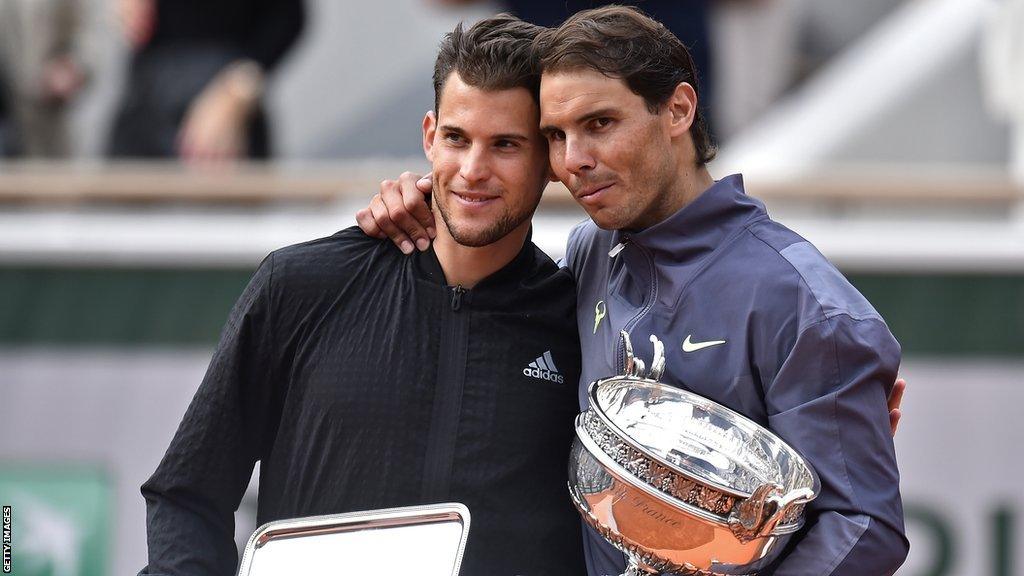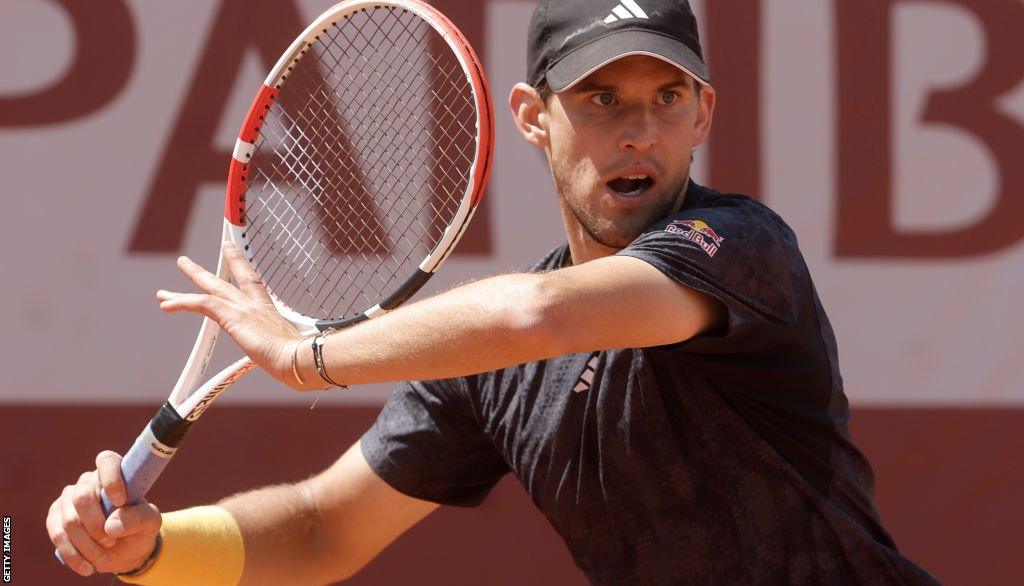French Open 2023: Dominic Thiem hoping to rediscover best form at Roland Garros
- Published

Dominic Thiem (left) has reached two French Open finals, losing to Rafael Nadal in both 2018 and 2019
As the tennis world came to terms with Rafael Nadal announcing his absence from this year's French Open, there was a certain irony about the identity of the man who directly benefited from his withdrawal.
Next in line in the rankings, moving up into the space left in the men's singles draw by the Spanish great, was Dominic Thiem.
In 2019, when Thiem lost for the second year running to Nadal in the Roland Garros final, it felt inevitable the Austrian would get his hands on the Coupe des Mousquetaires one day.
Four years later, Thiem has still not won the one major trophy which many thought he was destined to do.
Winning his first Grand Slam title at the 2020 US Open has been the pinnacle of an enviable career that took Thiem to number three in the world.
Less than a year later, his journey was derailed by a wrist injury which kept him off the ATP Tour for 10 months and resulted in his ranking plummeting to outside the top 350 last year.
"It was difficult for me to cope with - and unusual - because it was the first time I had been out injured for a long time," Thiem, who is back up to 91st in the rankings, told BBC Sport.
"In the first 10 weeks I was in a cast so couldn't do anything anyway - and then the struggles started when I began to play again.
"It was so tough because before I was used to ripping the ball, I was used to using the wrist at full power and the whole body at full power, and then it was just not possible.
"My mind wanted to play full power. The body wouldn't allow it."
The excoriating style which led to Thiem's success - raw power generated through the wrist on both his forehand and one-handed backhand - took its toll on his body.
So did his eagerness to play as much as possible. Thiem became known for his hectic and heavy scheduling, and concedes now that his previous workload had contributed to the problems.
"I was always very lucky with my body because I was pushing it to the limit almost every day when I was young," he said.
"Because of all those strokes I did in my career up to then, it was inevitable something was going to happen at one point.
"Now everything is well and the body feels great."
The road back towards the top of the ATP Tour has been long and arduous.
Being unable to execute the aggressive shot-making for which he had become feared left Thiem lacking trust in his technique.
On his return to the tour in March 2022, Thiem lost his first seven matches and, after a French Open first-round exit last year, he admitted nerves were "toxic" to his forehand.

Thiem damaged the sheath of his right wrist - which protects the tendons linking the forearm to the hand - but his recovery did not require an operation
Afterwards Thiem decided to play some events on the ATP Challenger Tour - the second tier of men's tennis - to rebuild confidence.
He has since won 34 of his 61 matches across all levels, having used his protected injury ranking and wildcards to play at the biggest tournaments.
Thiem's encouraging display in a narrow 3-6 6-1 7-6 (7-5) defeat by Greek world number five Stefanos Tsitsipas at the clay-court Madrid Open last month felt particularly significant.
"My level is getting much better because the beginning of the year was not good at all," said Thiem, who plays against Argentine world number 63 Pedro Cachin in the French Open first round.
"I was playing at a pretty bad level, definitely not good enough for the tour or for the top guys.
"Then at Indian Wells and Miami things changed. I started to play well and the clay season has been decent.
"The match against Tsitsipas was close, really close, giving me the feeling I am able to play at that level.
"I've been working very well and very hard for the past six weeks. I hope that will pay off at Roland Garros."
Fast approaching 30, Thiem says he does not feel young in tennis terms anymore.
Yet there is no bitterness, or even recognition, that he has been deprived of what are generally the peak years of a player.
"I have the feeling that all the years before were an amazing peak," said Thiem, who also reached the 2020 Australian Open final in a career-best year where only Novak Djokovic earned more ranking points.
"I was in the top 10 for five years consecutively, that was way more than I was expecting or hoping from my career.
"But I had the feeling no athlete - or almost no athlete - goes through a long career without major injury.
"Even when there were some setbacks in the recovery process, I had the feeling I was dealing with it pretty well.
"That's one thing I learned in all this time: if you are not able to change something, the best thing is to accept it and let it go. That's the healthiest way to digest it."
In the aftermath of his US Open triumph, Thiem decided to take two months away from the tour to have a "small reset" because of the physical and emotional impact of finally achieving the prize he had been striving for almost his whole life.
That enabled more time to pursue interests outside of tennis.
Championing environmental causes, including reducing plastic pollution and the protection of bees, is close to his heart.
Long walks with his dog Elon - named after the multi-billionaire entrepreneur Elon Musk - is one of his favourite ways to enjoy nature and switch off from the world, while he has also launched a range of fashion sunglasses.
But, having taken up tennis aged six with his parents both being coaches, he says his passion for the sport never disappeared.
"The love of tennis never died - it was just covered by thoughts in my mind which were not easy," he said.
"But deep inside, the love of tennis was always there and will always be there, I'm 100% sure of that.
"Now I have a pretty clear goal in front of my eyes which is to get to my highest level tennis-wise.
"I definitely saw it was possible. This is the clear goal I have in the future - to reach another peak."

Will they carve a brighter future down under? Ten Pound Poms starring Michelle Keegan and Warren Brown
Could eating nuts reduce your waistline? Michael Mosley chews over the surprising benefits of these nutrient powerhouses
